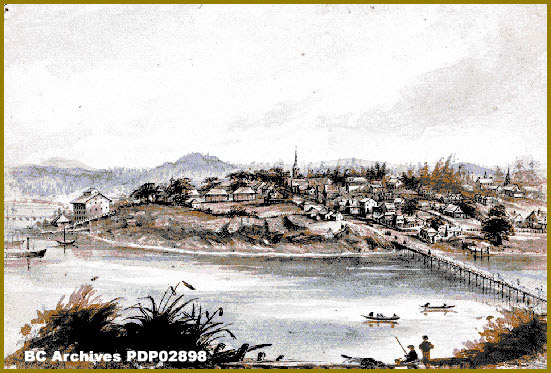
 |
| Across the James Bay Bridge and Into Victoria |
Editor British Colonist:- I notice in your paper that Capt. Layton will play Eleven Cricketers on the Island with broomsticks. I have therefore the following propostion to make to that gentleman: I will play that gentleman and his Eleven for the sum of $1000, on condition that they use broomsticks, and that I shall be allowed a bat, two fielders and eleven wickets. Capt. Layton's Eleven are: Messrs. Whittaker, Ballantyne, Layton, Chisholm, Young, Hamilton, Richardson, Green, Ellis, Howlett.Howard's letter elicited the following response from Harris:Yours truly,
J.H.[sic] Howard.Esquimalt, Oct. 13,18624
Editor British Colonist- Sir:- I have noticed in your columns that a Mr. John T. Howard has made a challenge to eleven of Victoria with broomsticks, and I "make a proposition," which I hope will be accepted. I will back one only of the "broomstick eleven" against Mr.Howard, (viz: Mr. Frank E.Howlett) to play (with bats a single-wicket match) against him. This, this only,is the true test of a cricketer's abilities; and since he appears to have a weakness for Champagne suppers, I will give him his choice, whether for champagne suppers or for dollars; the match to be played on saturday next, when the redoutable Mr. Howard will have an opportunity to show his powers, and of bearing testimony to the "extraordinary execution" of his broomstick opponent.Several days later Howard's retort appeared in the paper:I remain, sir, Your obedient servant,
Allan M. Harris.James' Bay Oct 20th, 1862.5
Editor British Colonist:- In reply to the curt communication in your paper of this morning, I have the following answer to make: I promise to play this gentleman (Mr. Frank E. Howlett,) for a champagne supper or for "dollars," if my first proposition is accepted, according to the rules prescribed in said proposition. If the "newcomers" feel inclined to make a few hundred dollars in an easy way, perhaps, by accepting said proposition, they will be gratified beyond their most sanguine expectationsThere is no record of a broomstick match ever having come off. However, on October 27, four days after Howard's last challenge was published, the Colonist reported that a side headed by Howlett, also known as the "Norfolk Hare,"7 defeated a team put together by Howard. Although, Howard's cricket challenge may be considered a footnote to history, it shows us several very important things about cricket in Victoria during the 1860's. It shows us that cricket was not necessarily dominated by the colonial elite; it shows us that men like Howard and Harris were in a position to identify themselves with the noble game. It also shows us that gamblers and sportsmen played an important role in defining Victoria's early society. In part, this was a continuation of traditional British practices. Sports such as cricket were seen as gentlemanly pursuits and while gambling was frowned upon, it also had connotations of club life. However, it is unlikely that the Colonial Office had the Harris-Howard rivalry in mind when they decided that Vancouver Island should become a model English settlement. The presence of informal British institutions, like cricket, combined with the formal institutional presence of Her Majesty's Navy, allowed Victoria to maintain something of its British character in the face of pressure from American miners and annexationists.I remain, Sir, Your obedient servant
John T. Howard.Victoria, Oct. 21, 18626
he had two wives. One, Mary, he had married secretly in England, ... the other Nellie, he had picked up in San Francisco after some success in the California goldfields. Nellie was running the bar at Howard's Royal Oak Inn in Esquimalt. It took some time but first wife Mary tracked him down and finding him well off decided to make her claim known. Howard who was fifty-seven years old offered to set Mary up in a little house where he would come for visits. Mary, a staunch Anglican would have none of it. Instead she had an Anglican minister go to Howard's inn and inform Nellie that she was to be expelled from the church. Nellie agreed to leave Howard when he gave her money enough to sart up a boarding house. Apparently his first wife Mary then had to take over running the Esquimalt bar to help pay the mortgage taken on it to pay off Nellie.8